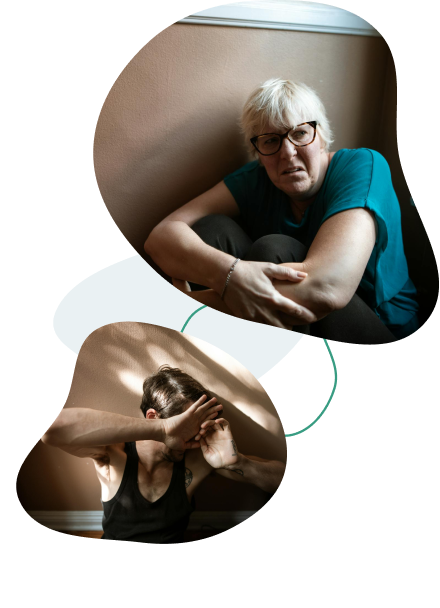Our team of experienced professionals can assist you in dealing with trauma & PTSD.

Always remember that no matter how much trauma we might be forced to endure, the human mind will always find a way to adjust.
You just need someone who can validate your feelings and help you see the light at the end of the tunnel.
Short for post-traumatic stress disorder, PTSD is a condition that can develop after you experience an event that you perceive as shocking, dangerous, and frightening
Win back the life you want and deserve!

Book an appointment that feels right for you — all our practitioners are compassionate, understanding, and here to truly listen.
In your session, you'll have the space to gently explore whatever you're experiencing, in your own time and in your way.
Together, you and your practitioner will create a personalised support plan, focused on helping you feel more grounded, balanced, and in control.
Some people find clarity in a single session, while others choose ongoing support — there’s no one-size-fits-all, only what feels right for you.
As your journey unfolds, we're here to walk beside you — helping you rediscover calm, confidence, and emotional wellbeing.




Whenever we hear the words “trauma” or “PTSD” we often think of war veterans. For some reason, we tend to associate trauma & PTSD with terrible events like natural disasters and war.
But while those who’ve seen the battlefield (or the horrors that follow earthquakes, tsunamis, etc.) are indeed at a high risk of developing PTSD, they’re not the only ones.
Trauma is a complex phenomenon that can occur as a result of various negative experiences.
So, let’s take a moment to understand trauma & PTSD.
In essence, a traumatic event is any negative event that triggers a strong emotional response. More specifically, you lose your sense of security which might lead to depression, feelings of helplessness, and an overall grim perspective on life.
As you can see, this definition covers a broad spectrum of events. But leaving aside armed conflicts, natural disasters, and other similar calamities, some of the most common reasons why people request trauma counselling are:
Current research indicates that emotional trauma may be the result of common events for most people, but which are subjectively perceived as aversive.
But while trauma is a normal reaction to a frightening situation, the effects can seriously interfere with your relationships, work, and personal life.
Short for post-traumatic stress disorder, PTSD is a condition that can develop after you experience an event that you perceive as shocking, dangerous, and frightening.
To get a sense of what PTSD feels like, try to recall the last time you felt extremely anxious about something. Now imagine living with this anxiety every day; imagine feeling restless, hypervigilant, and on edge 24/7.
Most experts believe that under normal circumstances, people overcome trauma and adjust to their new circumstances in about several weeks.
If you’ve been struggling with these symptoms for more than a couple of weeks, perhaps it’s time to consult a professional.
As you probably know, people deal with trauma in different ways. Some seek comfort at the bottom of a bottle, while others bury themselves in work.
It’s hard to go about your daily business when you’re constantly feeling on edge and there’s no one around with whom to share your pain.
Most of us have a natural tendency to avoid internalising traumatic events because it’s too painful and distressing to be permanently connected to an unpleasant memory.
So, how can you overcome something that you’re too terrified to approach?
By consulting a professional who can assist you in facing your trauma, accepting the feelings it produces, and adjusting to a new life.
Our trauma counsellors are equipped with a wide range of therapeutic approaches such as Cognitive-Behavioral Therapy, Acceptance and Commitment Therapy, Schema Therapy, and many other evidence-based strategies.
Trauma counselling involves a long but rewarding process of self-exploration during which you gradually dig up painful experiences and discover the inner resources you need to start building a future.
But it doesn’t happen all at once. In fact, facing your trauma abruptly generates an overwhelming sense of distress which can increase the risk of suicide.
That’s why trauma counsellors focus on building a solid therapeutic alliance before addressing the core problem.
Through guidance and emotional support, a trained professional can help you cultivate post-traumatic growth. In other words, you will have the opportunity to find constructive ways to manage painful emotions and move forward in life.
With the help on our counsellors, you can:
Always remember that no matter how much trauma we might be forced to endure, the human mind will always find a way to adjust.
You just need someone who can validate your feelings and help you see the light at the end of the tunnel.

Take the first step – speak with a psychologist or counsellor today.